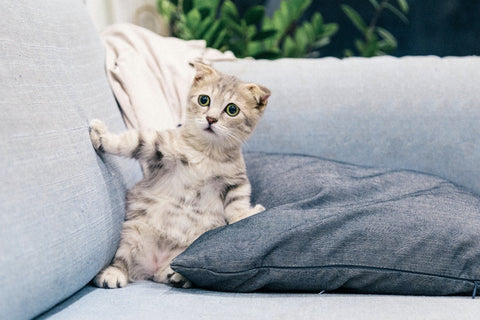Do you have a cat that seems nervous, scared, or stressed? Does your cat hide under the bed, scratch the furniture, or pee outside the litter box? If so, your cat may be suffering from anxiety.
Anxiety is a feeling of fear or worry that can affect your cat's health and happiness. Anxiety can make your cat act differently and behave in ways that are not normal for them. Anxiety can also cause physical problems, such as hair loss, weight loss, or infections.
Anxiety can have many causes, such as pain, illness, trauma, noise, old age, or changes in the environment. Some cats may be more prone to anxiety than others because of their genes or their early experiences.
Whatever the cause, anxiety can be treated and prevented with proper care and attention. In this blog post, we will share some techniques that you can try to help your cat feel calmer and more secure.
Also Read: How to Feed Your Kitten Right – The ultimate guide to cat nutrition
HOW TO TREAT CAT ANXIETY?

There are different ways to treat cat anxiety. The best way depends on your cat's personality and the reason for their anxiety. You may need to try different methods or combine them for the best results. Here are some options:
- Cat Anxiety Bed: The cat anxiety bed is a special bed that can help your cat relax and feel safe. The bed has raised edges that create a cozy and snug space for your cat to curl up and feel protected. It also has soft and fluffy material that soothes your cat's nerves and reduces stress. You can find cat anxiety beds online or in pet stores.
- Pheromones: Pheromones are natural chemicals that cats release to communicate with each other. The mother cat makes pheromones that calm and comfort her kittens. You can use artificial pheromones that copy the natural ones to create a peaceful atmosphere for your cat. You can find pheromones in different forms, such as sprays, diffusers, collars, or wipes.
- Mental Stimulation: If your cat is bored or lonely, they may feel anxious or depressed. To prevent this, you should give your cat enough mental stimulation and social interaction. You can do this by playing with your cat regularly, giving them toys and puzzles, letting them see outside through windows and perches, and spending quality time with them.
- Medication: In some cases, medication may be needed to help your cat cope with anxiety. There are different types of anti-anxiety medications for cats, such as benzodiazepines, antidepressants, or buspirone. Medication should always be given by a vet after checking your cat's health and behavior. Medication should also be used along with other methods.
Also Read: 6 Easy Ways To Prevent & Treat Obesity In Cats
HOW TO PREVENT CAT ANXIETY?

Prevention is better than cure when it comes to cat anxiety. There are some things you can do to avoid or reduce the chance of your cat developing anxiety in the first place. Here are some tips:
Provide a Safe Environment: Your cat needs a safe and comfortable environment where they can feel secure and relaxed. You should provide your cat with enough resources, such as food, water, litter boxes, scratching posts, hiding places, resting areas, etc., and make sure they are clean and easy to reach. You should also avoid exposing your cat to loud noises or sudden changes in their routine or surroundings.
Socialize Your Cat Early: Early socialization is important for your cat's mental health and behavior. Socialization means exposing your cat to different people, animals, sounds, smells, objects, etc., in a positive way when they are young (between 2 and 7 weeks of age). This way, your cat can learn to be confident and adaptable to different situations and things.
Provide Routine and Consistency: Cats are creatures of habit and they like to have a predictable and consistent routine. You should try to feed, play, and interact with your cat at the same time every day, and avoid making big changes in their schedule or environment. If you have to make a change, do it slowly and carefully.
Seek Professional Help: If you notice signs of anxiety in your cat, don't hesitate to seek professional help. Your vet can rule out any medical causes of anxiety and prescribe medication if needed. A veterinary behaviorist can help you identify the source of anxiety and design a behavior modification plan for your cat. A professional can also give you support and guidance on how to deal with your cat's anxiety.
Source:
1) 14 India Pet Ownership Statistics to Know in 2023 | Pet Keen. https://petkeen.com/pet-ownership-statistics-india/.
2) India: share of pets owned by pet type 2022 | Statista. https://www.statista.com/statistics/1238576/india-share-of-pets-owned/.
3) 12 India Pet Industry Statistics to Know in 2023: Trends ... - Pet Keen. https://petkeen.com/pet-industry-statistics-india/.
4) Cats in Indian Culture and History: Where Do They Fit In?. https://petkeen.com/cats-in-indian-culture-and-history/.



